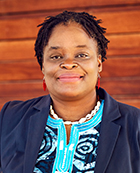
Dr. Roberta Timothy is an Assistant Professor in the Teaching Stream, Black Health Lead, and is the inarugral Progam Director for the upcoming (September 2023) MPH Program in the field of Black Health at Dalla Lana School of Public Health at the University of Toronto. Dr. Timothy is also an Adjunct Professor in Critical Disability studies at York University. She specializes in the areas of Black health; intersectionality, violence, transgenrational trauma, and ethics in health work; health and racism; art-based methodologies; transnational Indigenous health; and anti-oppression/anti-colonial approaches to mental health. Dr. Timothy has worked for over 30 years in community health working on resisting anti-Black racism and intersectional violence strategies. Dr. Timothy is also co-founder and consultant at Continuing Healing Consultants where she implements and teaches her intersectional mental health model "Anti-Oppression Psychotherapy". She is an interdisciplinary scholar, health practitioner, and political scientist, who examines global health and ethics from a critical trauma-informed decolonizing framework. Her current research is entitled: "Black Health Matters: National and Transnational COVID-19 Impact, Resistance, and Intervention Strategies Project / La santé des noirs compte: le covid-19 et son Impact - un projet de recherche national et transnational sur nos actes de résistances et stratégies d’intervention". For more information see: https://blackhealthmatterscovid19.ca/ Dr. Timothy utilizes a methodology entilted: "Resistance Education" in all her work. She has been living with a visual disability for over 25 years.
Title: Anti-Oppression Psychotherapy and Transgenerational Trauma
Learning Objectives:
Abstract:
The keynote presentation will look at the impact of colonial violence and the need to decolonize one’s practice in order to deal with intersectional trauma/violence. I will examine how Anti-Oppression Psychotherapy (AOP), a decolonizing mental health trauma-informed model, can be used as a tool to create healing and wellness with intersectional clients, focusing on Black, indigenous, and purposefully marginalized populations. Firstly, the historical and current context in relation to the impact of anti-Black racism/racism and other determinants of health or what I call “health violence” will be briefly explored. Secondly, the importance of theoretical and methodological concepts and practices of AOP will be discussed and essential definitions of AOP will be described. Thirdly, some of the principles of AOP will be explained in the context of issues relating to colonial trauma, transgenerational connections and psychotherapy. Finally, the experiences of intersectional transgenerational colonial trauma in clients’ lives will be looked at using case studies to indicate how AOP can be used as a trauma-informed model for anti-racist, social justice praxis.
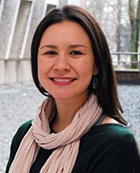
Amy Bombay (PhD) is an Associate Professor in the Department of Psychiatry and the School of Nursing at Dalhousie University. Amy is a member of Rainy River First Nations and her primary areas of inquiry have explored the links between intergenerational and contemporary exposure to stressors, cultural identity, and mental health among Indigenous peoples in Canada. Her research exploring the different pathways by which Indian Residential School trauma is transmitted across generations has been influential in educating the public about the long-term effects of colonialism and in influencing policy and practice related to Indigenous health.

Robyn McQuaid (PhD), is an Assistant Professor at Carleton University in the Department of Neuroscience and a Scientist at the University of Ottawa Institute of Mental Health Research at the Royal Ottawa. Dr. McQuaid’s research examines the impacts of stressors and traumatic experiences on mental health disorders among various populations. Her research program uses approaches that range from molecular techniques to community-based participatory research and prioritizes the examination of how sociodemographic, psychosocial, and biological correlates of various stressors come together to explain mental illnesses.
Title: Understanding the Continued Impact of Intergenerational Trauma and the Protective Role of Culture on Indigenous Health and Wellness
Learning Objectives:
Abstract:
The health and wellness of Indigenous peoples continues to be impacted by the current and intergenerational consequences of harmful colonization practices. Our work focuses on identifying the root causes of health inequities that exist between Indigenous and non-Indigenous peoples in Canada. This talk will highlight our research program that uses population data and community-based projects to understand how the intergenerational contributions of the Indian Residential school (IRS) system and other harmful government policies, such as the Sixties Scoop and the Child Welfare System, come to impact Indigenous wellness. Specifically, we will examine the pathways through which trauma and resiliency can be passed down across generations, and will further explore the quantitative links between these collective and historical traumas. A focus of this talk will be providing evidence on the protective role of culture, which can buffer the impacts of intergenerational and ongoing stressors to promote resiliency. Moreover, we will highlight how this research has been used for advocacy to educate and influence policies and programs affecting Indigenous peoples.
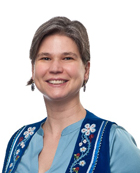
Dr. Janet Smylie is a family physician and public health researcher. She currently works as a research scientist in Indigenous health at St. Michael's hospital, Centre for Urban Health Solutions (CUHS), where she directs the Well Living House Applied Research Centre for Indigenous Infant, Child and Family Health. Her primary academic appointment is as a Professor in the Dalla Lana School of Public Health, University of Toronto. She maintains a part-time clinical practice with Inner City Health Associates at Seventh Generation Midwives Toronto. Dr. Smylie has practiced and taught family medicine in a variety of Aboriginal communities both urban and rural. She is a member of the Métis Nation of Ontario, with Métis roots in the prairies. Her research interests are focused in the area of addressing the health inequities that challenge Indigenous infants, children and their families through applied health services research. Dr. Smylie currently leads multiple research projects in partnership with First Nations, Inuit, and Métis communities/organizations. She holds a CIHR Applied Public Health Research Chair in Indigenous Health Knowledge and Information and was honoured with a National Aboriginal Achievement (Indspire) Award in Health in 2012. A Métis woman, Dr. Smylie acknowledges her family, teachers, and lodge.
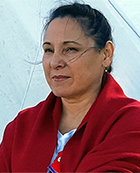
Meggie Cywink ACTIVIST / ADVOCATE / WRITER / CREATIVE PRODUCER / GENEALOGIST / RESEARCHER: Nindizhiakaaz Meggie Cywink nindigoo ojibwemong Niigan E’maset kwe. Waabizheshi nindoodem. Nindoonjibaa Adikamegoshii-ziibiing. For over 30 years, Meggie has been a passionate and relentless advocate for the Missing and Murdered Indigenous Women and Girls, Trans, and 2-Spirit (MMIWGT2S+) persons. After the loss of four loved ones, she brings an authentic perspective, with the unyielding knowledge that the work of families is complex. She believes there will always be a need to seek truth and justice and understands the significance of trust-building with families. Meggie believes in the resiliency of community, the arduous work of supporting Families and Survivors from a family-led and community-driven continuum through land-based ceremony and is dedicated to the families in honouring the spirits of their loved ones. Meggie worked for the Ontario, Ministry of Attorney General – Indigenous Justice Division as Special Advisor for the Ontario Missing and Murdered Indigenous Women and Girls - Joint Inquiry team from 2016 – 2019. She liaised with Ontario families, and the provincial and federal governments in her role. She brought experience and perspective that served to inform the level of trauma and emphasized the need to continue to help families heal. She has turned her attention to the healing of families and finding a way to help them move beyond the grief and traumatic loss. She is a grassroots MMIWGT2S+ Family Member who is the owner of an independent First Nations business, Seven Directions Consulting. Meggie has been involved in various MMIWGT2S+ initiatives and projects including We Dance for Life, spearheading numerous provincial healing gatherings, Shades of Our Sisters digital story and installation and the Circle of Aunties educational toolkit. She has also been engaged on a health advisory council to work with families in a therapeutic model designed to help families process traumatic experiences. She has spoken internationally on the MMIWGT2S+ platform. Meggie has a passion for genealogy and is currently, researching and authoring a book, “First Nations and All Our Relations”, that traces the collective ancestry of the Anishnaabe people back to 1789, including the exodus from Michigan into Manitoulin Island. In addition to honouring this collective remembrance, the proceeds of the book will support the placement of permanent grave markers and the continued upkeep of First Nations cemeteries on Manitoulin Island. “I believe in the empowerment of youth to change to course of Indigenous rights and history. By giving them the tools to make informed decisions about their choices we are walking together to help our children, our future leaders.”
Title: Story Medicine: Indigenous Approaches to Understanding and Addressing Trauma
Learning Objectives:
Abstract:
The concepts and constructs of mental illness and psycho-trauma as understood in modern psychology and psychiatry are not well aligned with traditional Indigenous worldviews and social systems. This can limit the relevance and effectiveness of mainstream diagnostic and treatment approaches. This situation is further complicated by the fact that historic and ongoing Euro-colonial policies and practices and anti-Indigenous racism persist as primary and root determinants of Indigenous mental, emotional, and spiritual imbalance and/or anguish. Given the striking and disproportionate burden of trauma and its associated co-morbidities among Indigenous populations there is a pressing need to identify and advance culturally relevant and effective healing modalities and workforce. Current policy and evidence direct us to ensure that this work is developed for and by Indigenous people.
Acute and chronic affective and cognitive conditions that interfere with fulsome engagement in key life activities cut across human societies and are commonly associated with traumatic life events. Indigenous worldviews and social structures are extremely diverse and there are countless distinct and nation specific understandings and responses to what might be externally interpreted as psycho-trauma. Emerging protective factors and healing approaches that cut across some (but not all) Indigenous societies will be discussed. These include: the contextualization of trauma and responses to trauma within everyday belief systems that centre spirituality, life meaning, and ongoing individualized roles and responsibilities; societal structures that are rooted in strong relationships to human kin and broader ecosystems; strength-based and affirmative treatment approaches; ceremonial healing practices; and storytelling traditions.
Building on First Nations and Métis story-telling traditions, our team of researchers has worked with Indigenous community partners and elders to adapt Narrative Exposure Therapy (NET) for use in Indigenous community contexts. This presentation will finish with an overview of this pilot study.
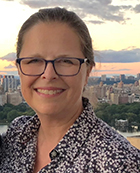
Lisa Andermann, MPhil, MDCM, FRCPC is an Associate Professor in the Department of Psychiatry, University of Toronto. She is Co-Chair of the Equity and Inclusion Council, and Director of the Toronto-Addis Ababa Psychiatry Program (TAAPP) assisting in the development of the first psychiatry residency training program in Ethiopia.
In addition to her work at the Mount Sinai Ethnocultural ACT team and Psychological Trauma Clinic, Dr. Andermann is a Consultant Psychiatrist at the Canadian Centre for Victims of Torture (ICHA); and with the Northern Psychiatric Outreach Program (NPOP-C) providing outreach to remote communities on Baffin Island. Dr. Andermann co-edited a book entitled Refuge and Resilience: Promoting Resilience and Mental Health Among Refugees and Forced Migrants (Springer, 2014).
She is a Board Member of the World Association of Cultural Psychiatry (WACP). She has been awarded the Don Wasylenki Award for Social Responsibility in the Department of Psychiatry (2018), Amina Malko Award from the Canadian Centre for Victims of Torture (2017) and Social Responsibility Award (PGME, Faculty of Medicine, University of Toronto, 2015) for her work with underserved and marginalized populations.
Dr. Andermann has been actively developing postgraduate training dealing with issues of social responsibility, cultural psychiatry and global mental health. She is a co-founder of Cultural Psychiatry Day, which has now expanded into an accredited national videoconference linking universities across Canada, and Mindfest, http://www.mindfest.ca.
Title: Refugee Mental Health: Understanding Culture, Intergenerational Trauma and Resilience
Learning Objectives:
Abstract:
Refugee mental health as an area of study involves a thorough understanding of social determinants of mental health. Cultural understanding is also central, as is having proper access to language and cultural interpreters. Acculturation and adjustment is at the heart of the refugee experience; there is always sadness, a sense of loss, nostalgia and grief for a lost homeland and way of life.
The refugee journey is generally categorized into three phases: pre-migration, migration, and post-migration. Trauma can take place during any and each of these phases, and can very greatly depending on the circumstances. Learning how to mitigate some of these stressors, particularly the post-migration stressors, is key; poverty, housing, unemployment or underemployment and social isolation can have a negative impact on mental health outcomes. However, these post-migration stressors can also be quite remediable with social and community support and good settlement services.
There has been a great deal of diversity of reporting of intergenerational trauma in refugee families. Working to understand the pathways and impacts of trauma transmission amongst newcomer and displaced populations is one step towards being able to develop programs and interventions that can work to improve mental health and wellness for refugees and their families, both now and in the future.